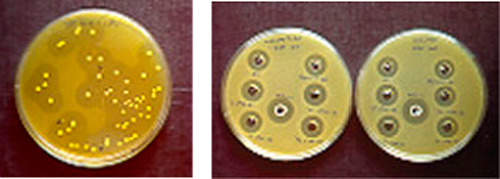ANTIMICROBIAL PEPTIDES
|
Description |
In our research group we are proceeding to the biochemical, immunological and genetic characterization of bacteriocins produced by lactic acid bacteria (BAL) of food origin.
They are antimicrobial peptides of small size, with a very potent antimicrobial activity against zoonotic bacteria and those responsible of foodborne diseases in man. These bacteriocins, purified to homogeneity, could be used in human and veterinary medicine as topical antimicrobials, possibly effective in the therapeutic or prophylactic treatments of acne and infectious eczema in humans, and in the mastitis of many animals.
In addition, they should also be evaluated for their possible use as antimicrobials against systemic infections of man and animals by Gram-positive bacteria (St. aureus, E. faecalis, E. faecium, etc.), resistant to most known antibiotics.

Lactic acid bacteria and antimicrobial activity of their bacteriocins.
|
How does it work |
The direct use of bacteriocins purified to homogeneity may allow the incorporation of one or more antimicrobial peptides into the drug formulations used in the therapeutic and prophylactic treatments of some human and animal pathologies.
These antimicrobial peptides purified to homogeneity could be evaluated as an alternative in the treatment of topical or systemic bacterial infections by Gram-positive microorganisms (St. aureus, E. faecalis, E. faecium, etc.), resistant to most known antibiotics.
Bacteriocins and lactic acid bacteria producing bacteriocins could be used as antimicrobial additives and as probiotics, respectively, in animal feed which would reduce the presence of spoiling and pathogenic microorganisms and enhance a competitive intestinal flora in the face of the development of many pathogens.
|
Advantages |
Bacteriocins can:
- Provide an alternative to the massive use of antibiotics.
- Contribute to the reduction of resistance to them.
- Combat an increasingly large group of pathogenic bacteria resistant to most of the antibiotics currently known and produced.
- Lactic acid bacteria producing bacteriocins could also be used as probiotics in animal feed.

Infectious pathologies that could be treated with bacteriocins.
|
Where has it been developed |
This technology has been developed in the Department of Nutrition, Bromatology and Food Technology of the Faculty of Veterinary Medicine of the Universidad Complutense de Madrid. This department already has an experience of more than 10 years in the biochemical, immunological and genetic characterization of bacteriocins produced by lactic acid bacteria of food origin.
The bacteriocins characterized up to now are nisin A, nisin Z, pediocin PA-1, lactocin S, enterocin A, enterocin B, enterocin P, enterocin L50A and enterocin L50B, enterocin JSA and enterocin JSB and enterocin HF. Currently we also have genetically modified L. lactis strains (OGM) producing nisin A, pediocin PA-1, enterocin P and enterocin A.
|
And also |
As a developing technology, these biological substances are still under evaluation and subject to legislation regulating their use. However, our research group can provide the experience and know-how to initiate "in vitro" studies as well as of the use of techniques for scaling up and evaluation of their effectiveness in real situations, all of them aimed to evaluate the potential of bacteriocins as natural antimicrobial peptides. We also consider ourselves prepared to address the use of lactic acid bacteria producing bacteriocins as probiotics in animal feed, not only from farm animals but also from the continental and marine aquaculture.
|
Contact |
|
© Office for the Transfer of Research Results – UCM |
|
PDF Downloads |
|
Classification |
|
Responsible Researcher |
Pablo E. Hernández Cruza: ehernan@vet.ucm.es
Department: Nutrition, Bromatology and Food Technology
Faculty: Veterinary Medicine


